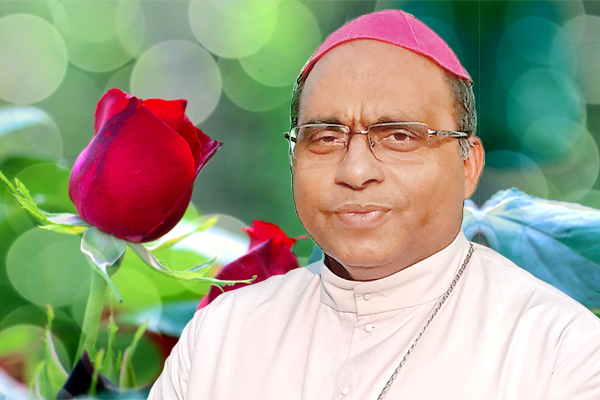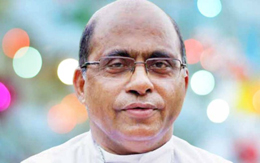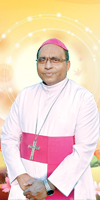Azadi ka Amrit Mahotsav Kolkata event honours four Clergymen
Pope Francis asks businesses to support working women: They’re ‘afraid to get pregnant’
Study: Christianity may lose majority, plurality status in U.S. by 2070
Indian politician declines Magsaysay Award under party pressure
Like John Paul II, Pope Francis heads to Kazakhstan during time of war

 “The church has been very active in the educational and health care fields and also in the social sector.Garo Hills would not have been what it is today without the Church.”
“The church has been very active in the educational and health care fields and also in the social sector.Garo Hills would not have been what it is today without the Church.”The Episcopal Ordination is fixed for 4th July 2020 at Sacred Heart Shrine, Tura, along with the sacerdotal diamond jubilee of Most Rev. George Mamalassery, the first bishop of Tura. The principal consecrator is Most Rev John Moolachira of Guwahati and the co-consecrators are Most Rev. Andrew R Marak, the bishop of Tura and Most Rev George Mamalassery.
My motto is: “To be all things to all men” (I Cor 9:22). The population of the diocese belong to different ethnic groups, religions, economic and social background etc. Among the Christians there are various denominations. The clergy and religious belong to different age groups and hail from the local Garo tribe and also from outside the diocese and the region, especially from South India. This does not mean that I want to please all. As a pastor, I would like to reach out to all and be as adaptable, inclusive and accessible as possible to all. Hence this motto.
The diocese of Tura is a vibrant and flourishing diocese. The first mission in Tura was opened in 1933 by Italian Salesians. From 1956 onwards South Indian missionaries came to serve in Garo Hills. The diocese was erected in 1973 with only a few parishes and Church personnel. The present Catholic population of the diocese is over 310,000, making it the diocese with largest Catholic population in Northeast India.
There are about 100 priests serving in the diocese of whom 54 are diocesan priests. Half of the diocesan priests hail from the local Garo tribe. More than 300 women religious belonging to 20 Congregations serve the people of the diocese. It must be said that, in spite of such variety among Church personnel, there is much understanding and spirit of collaboration. My first priority will be to help and support my Bishop Most Rev. Andrew R. Marak to render better and more varied pastoral care of the diocese.
The diocese is still young. In 2023 we will be celebrating the golden jubilee of the diocese. People are scattered in the remote villages far away from parishes. There is need to open more parishes, reach out to people in the villages and also impart adequate catechesis and pastoral care to them. Empowering the laity, pastoral care of the family and youth, etc., need to be taken up.
Although there are many tribes, Catholics belong predominantly to the Garo tribe. There are only a few hundred Assamese speaking Catholics. As far as the Garos are concerned, they were traditionally animists. They believed in a Creator God and they had some idea sacrifices and form of priesthood. So the Christian message is not totally alien to them, although the religious practices and forms of expression are different. The Church has integrated tribal music and art forms to religious worship in as far as they are in keeping with the Catholic faith. The Church has encouraged their cultural identity and their traditional cultural practices always emphasizing the need to strengthen their faith in Christ.
 How is the mission work going on and how is mission fervour alive in Meghalaya?
How is the mission work going on and how is mission fervour alive in Meghalaya?The diocese of Tura is involved in the integral development of the human person and the well being of the society as a whole. Apart from imparting moral and religious education and catechesis to its members, the Church is very actively involved in the educational, social and healthcare fields irrespective of caste or creed. Every parish has a school, hostels for boys and girls and dispensary. The clergy, the men and women religious, and catechists and lay leaders areworking very hard and are fully involved in the various activities of the Church. In this way, we have a very vibrant and alive diocesan community.
The Church has been very active in the educational and health care fields and also in the social sector. Garo Hills would not have been what it is today without the Church. There is so much more to do for the integral development of our people. So all are very much involved in the mission of the Church.
Fortunately, I feel we are saved from such maladies. The Garo society is egalitarian, very democratic, communitarian and generous in sharing. They are also very cosmopolitan as they are found in almost all the states of the region. Even though not rich, people are very generous and helpful in times of need. It is very much seen when natural calamities, sickness or death takes place in the village. The priest provides leadership, more by inspiring, animating and coordinating the work of various sections, but there is no ‘dominance’ or ‘clericalism.’ He is like one among them and is always available, sharing the joys and sorrows of the people. Such broad outlook certainly helps us to get out of ourselves and be more outgoing in thinking and in action.
I did my doctoral studies in Canon Law from 1991 to 1995 in Rome. The studies in Rome broadened my vision – interacting with priests from all over the world was very enriching. We could really experience the Catholicity of the Church there. In every country I visited, I was warmly welcomed whether be in parishes or homes, because I was a Catholic priest. That’s something very wonderful. Study of Canon Law too helped me to know the Church laws well and to apply them both as a help to people in need and also to ensure smooth running of the Church as a human society.
Jesus always wanted to do the will of His Father without counting the cost. His teachings on love, forgiveness, option for the poor, relationship with others, suffering etc were radical and He practiced it even up to the cross. It is a challenge to follow Him in all these. It is not easy to live as He did. I can only take small steps in following Him.
For me prayer is being aware of the presence of God, conversing with God and united with Him in as much as possible. In the missions the workload is heavy and the priest has to do such a lot of things including running the parish school and other institutions. It may not be possible to spend long hours in the chapel in prayer. But prayer can take place in the vehicle….in the school and while walking to the village. Offering all what we do to God… asking His grace and guidance, trying our best to fulfil our responsibilities etc. I suppose that is the spirit of Prayer. Canon Law (CIC can. 276§ 2) too mentions that the primary means for clerics to attain holiness is faithfully and untiringly fulfilling their pastoral obligations. Of course this cannot be done unless one is united with God and also have certain amount for personal prayer.
I was born into Chirackal Airookkaran family in St Xavier’s Forane Parish, Karukutty. My parents were very devout and God fearing. I had three sisters and one brother. Only one sister and brother are alive now. My father was a news paper reporter and agent. He was affectionately called ‘Deepika’ because he worked very hard to promote this Catholic daily. He was associated with priests and our own priests from the family often visited the family. I had my primary education in the school run by the CMC sisters in Karukutty. The sisters laid a very good Catholic foundation in my life. Although I was the eldest son in the family, when I expressed my desire to join the seminary after matriculation in 1975, my parents were very happy. I did attend a vocation camp for the Archdiocese of Ernakulam in Thrikkakkara but due to some mix up of letters I could not take admission in time. Then I went to work in KCM press of the CMI Fathers at Karickamuri. There, Fr Paul Akkara CMI and the FCC sisters who worked in the press helped me to keep alive my desire to be a priest. I had the good fortune of serving daily mass there and also meeting so many priests and brothers.
If I recall correctly, the call to Tura came through an advertisement in your prestigious weekly ‘Sathyadeepam.’ I responded by writing to Servant of God Most Rev. Orestes Marengo SDB, the Apostolic Administrator of the then new diocese. He immediately accepted me and I joined the diocese in 1976. My priestly formation was done in the various seminaries of Shillong. After the ordination, I served as assistant parish priest for 4 years. The parish was vast and we had more than 160 villages. We were constantly in the villages, moving from village to village. Life was tough but it was the most fulfilling experience in my life. I was sent for higher studies in 1991 by Most Rev. George Mamalassery, the first bishop of Tura. After my doctoral studies in 1995, I was appointed rector of our Minor Seminary. After 9 years, I was appointed as the Diocesan Procurator from 2004 to 2009. In 2009 I became the parish priest of our Cathedral Church. In 2011, I was called to Shillong to be the rector of Oriens Theological College. In the Theologate I had the advantage of integrating my pastoral experience with teaching and formation. My bishop called me back again in 2014 to be diocesan procurator one more term of five years. Last year I was appointed as parish priest of St Luke’s Church and director of our new pastoral centre. I was fully involved in these responsibilities when this new development took place.
Leave a Comment